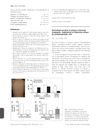 December 2024 in “Asian Journal of Pharmaceutical and Clinical Research”
December 2024 in “Asian Journal of Pharmaceutical and Clinical Research” Combining synthetic and herbal treatments may help with hair loss, but more research is needed.
 June 2021 in “Journal of Emerging Technologies and Innovative Research”
June 2021 in “Journal of Emerging Technologies and Innovative Research” Rice water and hibiscus can help improve hair health and growth.
[object Object]  January 2020 in “Asian journal of applied science and technology”
January 2020 in “Asian journal of applied science and technology” Good nutrition is crucial for health and preventing disease, and supplements can help prevent nutrient deficiencies.
 November 2004 in “Medical Journal of Indonesia”
November 2004 in “Medical Journal of Indonesia” Hormonal imbalances can cause skin and hair problems in women, and treatments that block male hormones can help.
 434 citations,
October 2003 in “PTR. Phytotherapy research/Phytotherapy research”
434 citations,
October 2003 in “PTR. Phytotherapy research/Phytotherapy research” Natural products in cosmetics are beneficial for skin and hair care with low toxicity.
 151 citations,
November 2018 in “International Journal of Pharmaceutics”
151 citations,
November 2018 in “International Journal of Pharmaceutics” Nanoparticles improve drug delivery through the skin but more research is needed on their long-term effects and skin penetration challenges.
 37 citations,
January 2009 in “Dermatology”
37 citations,
January 2009 in “Dermatology” Healthy women tend to lose more hair in July and April, and the least in February.
 25 citations,
November 2014 in “Ageing Research Reviews”
25 citations,
November 2014 in “Ageing Research Reviews” Skin aging is caused by stem cell damage and can potentially be delayed with treatments like antioxidants and stem cell therapy.
 17 citations,
April 2021 in “Clinical Phytoscience”
17 citations,
April 2021 in “Clinical Phytoscience” Chitrak is a medicinal plant with health benefits like fighting microbes, reducing inflammation, and promoting hair growth, but it can be toxic and needs more research.
 12 citations,
May 1989 in “Postgraduate Medicine”
12 citations,
May 1989 in “Postgraduate Medicine” The document concludes that hair loss is common and can be treated with medications like minoxidil or surgical options, and it significantly affects people's psychological well-being.
 3 citations,
November 2018 in “Journal of cellular physiology”
3 citations,
November 2018 in “Journal of cellular physiology” Serenoa repens and N-acetyl glucosamine/milk proteins complex may help with hair growth and prevent hair loss.
 1 citations,
August 2023 in “International journal of pharmacy & integrated health sciences”
1 citations,
August 2023 in “International journal of pharmacy & integrated health sciences” Cosmeceuticals are popular for their skin health benefits and anti-aging effects.
 1 citations,
January 1996 in “Springer eBooks”
1 citations,
January 1996 in “Springer eBooks” Diet affects baldness; eat balanced, less animal fat, more fruits, vegetables, and cereals.
 November 2023 in “International journal of biology, pharmacy and allied sciences”
November 2023 in “International journal of biology, pharmacy and allied sciences” Herbal treatments can help with hair problems, but more research is needed.

Botulinum toxin type A significantly reduces scalp psoriasis severity compared to placebo.
August 2024 in “Nutrients” Probiotics help reduce hair loss and increase hair growth in people with androgenic alopecia.
 February 2024 in “Endocrinology and Disorders”
February 2024 in “Endocrinology and Disorders” Balanced hormones are crucial for women's health, and can be managed with lifestyle changes or hormone therapy if needed.
December 2022 in “Frontiers in Microbiology” The scalp microbiome is more diverse and may be more important in hair loss than the gut microbiome.
 22 citations,
March 2004 in “Dermatology”
22 citations,
March 2004 in “Dermatology” Topical estrogen helps hair growth in menopausal women with no major side effects.
 5 citations,
June 2015 in “British Journal of Dermatology”
5 citations,
June 2015 in “British Journal of Dermatology” A certain medication improved severe itching in a boy with liver and bowel disease by reducing histamine levels, suggesting a new treatment target.
 41 citations,
January 2007 in “Journal of Korean Medical Science”
41 citations,
January 2007 in “Journal of Korean Medical Science” Minoxidil and ATRA together boost hair growth more effectively than minoxidil alone.
 1 citations,
November 2011 in “Dermatologica Sinica”
1 citations,
November 2011 in “Dermatologica Sinica” Women using hair relaxers with alopecia had lower zinc levels, suggesting zinc deficiency might contribute to hair loss.
 13 citations,
August 1995 in “The Journal of Steroid Biochemistry and Molecular Biology”
13 citations,
August 1995 in “The Journal of Steroid Biochemistry and Molecular Biology” The activity of a specific rat enzyme in the prostate and epididymis is highly dependent on the acidity level.
 76 citations,
December 1997 in “Fertility and Sterility”
76 citations,
December 1997 in “Fertility and Sterility” Finasteride reduces hair growth better, but spironolactone has more side effects.
 1 citations,
December 2010 in “Elsevier eBooks”
1 citations,
December 2010 in “Elsevier eBooks” Cell transplantation faces challenges in genitourinary reconstruction, but alternative tissue sources and microencapsulation show promise.
 October 2020 in “Veterinary Dermatology”
October 2020 in “Veterinary Dermatology” New treatments and diagnostic methods for various animal skin conditions showed promising results.
 98 citations,
October 2012 in “Dermatologic Clinics”
98 citations,
October 2012 in “Dermatologic Clinics” Eating the right nutrients can improve hair health, but taking extra supplements usually doesn't help unless you have a deficiency.
 22 citations,
August 2011 in “Journal of Supercritical Fluids”
22 citations,
August 2011 in “Journal of Supercritical Fluids” Rice bran extract might help prevent hair loss.
[object Object]  14 citations,
January 2018 in “Advances in Clinical Chemistry”
14 citations,
January 2018 in “Advances in Clinical Chemistry” The document concludes that hormonal biomarkers are key for diagnosing hyperandrogenemia in women and hypogonadism in men.
 19 citations,
March 2011 in “Cutaneous and Ocular Toxicology”
19 citations,
March 2011 in “Cutaneous and Ocular Toxicology” Some chemicals absorbed through the skin can cause serious health problems.




























